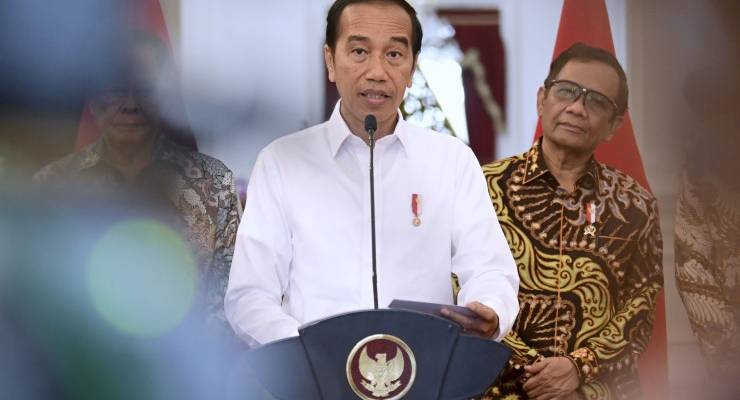
Indonesian President Joko Widodo took nearly a decade to make good on his 2014 election promise to address the nation’s historic gross human abuses — most of them the bloody work of the police and military.
Last week Widodo (known as Jokowi in Indonesia) listed 12 of the historic atrocities that have blighted the nation’s human rights record. Hundreds of thousands of Indonesians were killed, tortured, raped, jailed and exiled in these incidents, and these are only the best known of the widespread and systematic abuses by the armed forces. He expressed his deep regret and resolve to ensure some form of compensation would be made.
Now nearing the end of a second five-year term in office, Widodo is likely considering his legacy and standing with Indonesians and the international community. According to various surveys, most Indonesians want accountability for the armed forces’ brutality that has stained Indonesia’s record. Last year Widodo assembled a team led by veteran diplomat Makarim Wibisono to investigate historic abuses and recommend reparations.
Indonesia’s commitment to human rights had already been called into question by a new criminal code recently ratified by the Widodo administration and widely thought to undercut civil liberties. It includes a penalty of jail time for sex outside marriage, and jail terms for “blasphemy” and for insulting national leaders.
Widodo’s long overdue efforts to address the historic atrocities have been understood as half-hearted at best. While listing a series of abuses, he failed to mention the Indonesian military’s lengthy history of brutality in East Timor or cite other significant human rights violations documented in Indonesia over the years. Most importantly, he said nothing about prosecuting those responsible.
“I have deep sympathy and empathy for the victims and victims’ families,” he said in his State Palace speech on the violations. “Therefore, first of all, the government and I are trying to restore the victims’ rights in a fair and wise manner without negating the judicial settlement.”
The reparations might include scholarships and “physical rehabilitation”, a senior minister reportedly said.
Dating from 1965 to 2003, the severe transgressions Widodo acknowledged began with the army-orchestrated anti-communist purge of the 1960s, which left as many as half a million Indonesians dead and thousands locked up for decades.
The mass slaughter ushered in the military dictatorship of General Suharto, who went on to rule Indonesia for 30 years, institutionalising corruption, controlling the media and brooking no dissent. Suharto’s New Order regime introduced “dwifungsi” — dual function — which enmeshed the military in every facet of Indonesian society, providing the armed forces with immense social and economic power along with a free hand to wage war on recalcitrant civilians.
More recent human rights atrocities acknowledged by Widodo include the killing of dozens of locals in a police and army operation in Indonesia’s eastern-most province of Papua in 2003 — officers were accused of kidnapping, torture and murder. In the same year, in the far-western province of Aceh, troops rounded up residents in a village thought to be a centre for the rebellious Gerakan Aceh Merdeka (Free Aceh Movement) and tortured, shot and burnt villagers alive.
Other transgressions include the spate of thousands of extrajudicial executions of criminals and other offenders by undercover army death squads in the early 1980s; the 1989 murder and torture of as many as 130 Islamist villagers in Talangsari, Lampung, by soldiers and military police deploying helicopters and napalm; and the armed forces’ abduction, torture and murder of democracy activists in 1997 and 1998.
The might of the Indonesian armed forces waned to a certain extent in the years after Suharto was toppled in 1998, but observers have noted the military’s increasing sway in the Widodo administration. More recently, Indonesian military power has also been boosted by the upheaval of the COVID-19 pandemic.
Today the Indonesian military and police forces remain potent and often-feared powers across the Indonesian archipelago, with a record of near complete impunity for brutality and criminal behaviour. It seems unlikely Widodo will win any recognition for his human rights endeavours unless this impunity is thoroughly and forcefully addressed in a manner recognised by both the international community and the Indonesian population.








In a society where the military held seats in parliament until 2009 and where the military plays a vital role in the everyday life of Indonesians – they trust the army during natural disasters; this admission by Joko – 57 years late – is enormous.
The Indonesian genocide against the left and ethnic Chinese became the model for the very deliberate genocides that later occcured in Latin American and other places. If the Godless Communists killed their tens of thousands, then the Godless Capitalists killed their tens of millions.
And we and our alliances are them Godless Capitalists.
See the Jakarta Method: https://en.wikipedia.org/wiki/The_Jakarta_Method
Yes. The Indonesian genocide was conceived, funded and directed by two brothers, American fundamentalist presbyterians, who killed and plundered in the name of the Lord, for the benefit of their business associates, which included the richest men in the world.
See
JFK vs Allen Dulles: https://countercurrents.org/2021/02/jfk-allen-dulles-and-indonesia/
The Brothers: https://www.npr.org/2013/10/16/234752747/meet-the-brothers-who-shaped-u-s-policy-inside-and-out
The Devil’s Chessboard: https://www.goodreads.com/book/show/24723229-the-devil-s-chessboard
Thanks for the info
Between the military and the Islamic fundamentalists, Indonesia has always been a worry.
And we supported them to the hilt… That’s a worry too.
We trained them.
And supply them with choppers.